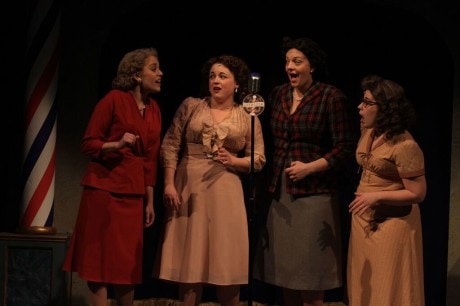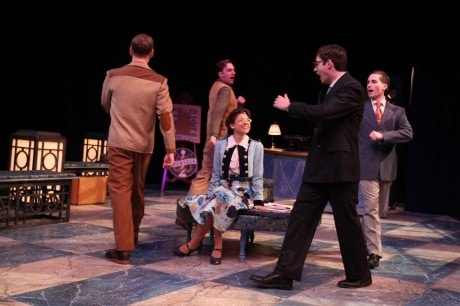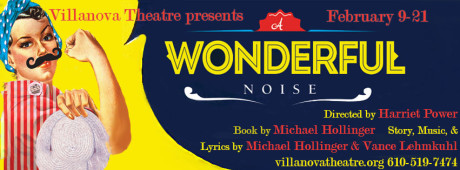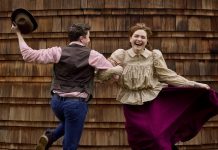When’s the last time you saw a musical about the competitive world of barbershop quartet singing? I’m not positive, but I think A Wonderful Noise may be the first show of its kind. (Truth to tell, the only musical I can think of that has any barbershop singing at all is The Music Man – and even then it’s only used in a few songs.)
If you’re concerned that a whole show celebrating an antiquated, virtually forgotten musical style might be too much to take, don’t worry. The songs in A Wonderful Noise aren’t exclusively barbershop harmony songs; instead, the show is more of a tribute to the nostalgic sense of camaraderie that music evokes than a full-fledged revival of the style. A Wonderful Noise will give you a bit of American history, a bit of musical history, and a lot of wonderful singing.

A Wonderful Noise is set in 1941 in St. Louis, at the annual championships of the Society for the Preservation and Encouragement of Barber Shop Quartet Singing in America (SPEBSQSA). (SPEBSQSA is a real organization that’s still around today, though it’s now known as the Barbershop Harmony Society.)
In the show’s opening moments we meet The Harmolodians, a quartet of lads from a rural Missouri town who are in the big city to compete. A few minutes later we’re introduced to a group called Sweet Adeline, a female quartet from Philadelphia that’s also competing – even though the SPEBSQSA doesn’t allow women. This quartet’s leader, Mae, has come up with a sure-fire publicity plan: the four ladies will take the stage disguised as men – wearing men’s suits and fake mustaches – then remove the mustaches so that they can startle the audience and prove to the world that women can do anything. (The group name “Sweet Adeline” is a reference to Sweet Adelines International, the female equivalent of the SPEBSQSA, which didn’t start until 1945.)
Far-fetched? Sure. And shaking up the world of barbershop singing may not have been the most successful way to draw attention to one’s cause back then. It was an era when young upstarts like Glenn Miller and Tommy Dorsey were storming the record charts, and barbershop singing, which was at the height of its popularity before 1920, was already largely considered corny and old-fashioned. (The score does acknowledge that, indirectly; the opening number quotes Miller’s 1941 hit “Chattanooga Choo Choo,” and the show’s second song, “All for One,” nods toward the popularity of barbershop music during World War I by quoting one of the most popular songs of that era, George M. Cohan’s “Over There.”)
But Michael Hollinger’s book is steeped in the culture of the 1940s without doing too many nostalgic references. And the show effectively depicts how women were beginning to assert their rights in the early 1940s, as women across the country flooded the work force to help with the war effort.
Hollinger goes out of its way to flesh out all the characters, sometimes with great sensitivity. Unfortunately, with eight main characters (plus a few supporting players), the script has a lot to juggle, and not every character gets enough time in the spotlight. (Two of the four women, Megan Rose’s Sadie and Galen Blanzaco’s Judy, have virtually nothing to do, despite good efforts by the actresses.) The script needs more balance: the women have a more complex story arc, while the men have richer, more interesting backgrounds.
And Hollinger tends to introduce plot elements that don’t pan out satisfyingly. For instance, when Mae tells the other women about her plan, she leads the women in “Give a Girl a Chance,” a proto-feminist anthem that’s one of the show’s best songs. Yet in the next scene we find the real reason Mae brought the group to St. Louis: to compete against her ex-boyfriend Chip, the leader of The Harmolodians, and attract his attention. It’s a move that makes the defiantly independent Mae look like a weakling, and undermines her character.
Another example: during Act One, we find that one of the men, Ned, is a conscientious objector, which makes him a misunderstood outcast in the run-up to World War II. It’s a development that promises a lot of juicy conflict – yet it’s only discussed for about a minute in Act One, then mentioned again briefly in the final scene. I wish we could have had more time for Ned to explain his position and argue with the others about it – and if that argument had been turned into a song, it could have been quite a compelling one.
Even comedic components tend to peter out. There’s a scene in Act One where the women, testing out their fake mustaches, accidentally use super-strong glue and get them stuck to their face so tightly that they can’t be removed. This raises the enticing possibility that the show is about to turn into a knockabout farce where the women have no choice but to pose as men… but after just one scene where two of the women appear in male drag, the women find a way to remove the mustaches after all, and the whole thing is dropped without much of a payoff.
Still, A Wonderful Noise has some sweet romantic elements that fit the innocence of its time period. The relationship between Mae and Chip is dealt with intelligently, with both characters depicted as proud, hard-edged individuals whose sentimental side comes out when they sing. (Laura Barron and Chris Monaco play the roles with a refreshing maturity.) And the romance between two other singers – David (Michael Kiliany), the only Jewish member of the men’s quartet, and Rose (Rachel DelVecchio), who David mistakenly thinks is Jewish too – is handled with great sensitivity.
The score, by Hollinger and Vance Lehmkuhl, has some very energetic songs, which the cast makes the most of. The comedy numbers work best, especially “I Can Sing That,” a comic and musical showcase for Jaclyn Siegel, who’s sensational as a spunky hotel desk clerk; “Ma Roney’s Daughter,” a barbershop number full of clever double entendres; and “Chit Chat,” in which a would-be ladies’ man (Dan Cullen) gives dating advice to a shy guy (Matthew Moorhead). But the score’s more serious numbers, like the contemplative love ballads “By Any Other Name,” “So Far” and “Corner of Your Heart,” tend to meander.
Most of the excitement in A Wonderful Noise comes from the fantastic young cast and the way they perform the songs. The two quartets each have a terrific vocal blend, and they play off each other well in ensemble numbers like “Chin Up” and the Act One closer “Give and Take.” And the quartet members get ample time to show off their strong voices in solo moments, with Monaco, Barron, and DelVecchio coming off best.
Music Director Peter A. Hilliard’s arrangements for the voices are inventive, and he has orchestrated the offstage band, which uses horns and reeds for a low-key approximation of the sounds of 1940’s pop.
The cast exudes a pleasant, easygoing sense of camaraderie under Harriet Power’s direction. There are eighteen scenes, and nearly every one requires a cumbersome, repetitive scene change that Villanova’s small, thrust stage just isn’t built for. The scene changes slow down the show significantly.

James F. Pyne’s set design uses art deco light fixtures that give a good sense of the time period. Rosemarie McKelvey’s costumes have an appealing sense of vintage style, and the zoot suits that the women wear in competition are snazzy. Jerold R. Forsyth’s lighting is well-deployed during a flashback scene where we see how Chip and Mae broke apart. And while the crowded floor doesn’t allow much room for dancing, Choreographer Sarah Sanford manages to squeeze in a wild, all-male jitterbug that gives the show a burst of pizzazz.
By the way, there’s a scene in A Wonderful Noise where the 1940’s women speculate for a moment about the possibility that someday a woman might become President of the United States. Just last week I saw another new musical, A Taste of Things to Come, where a group of 1960’s women speculate for a moment about the same thing. That may give you an idea of what musical theatre writers have on their minds in this election year!
Running Time: Two hours and ten minutes, including an intermission.
A Wonderful Noise plays through Sunday, February 21, 2016 at Villanova Theatre, in Vasey Hall on the Villanova University campus, in Villanova, PA. For tickets, call the box office at (610) 519-7474, or purchase them online.





